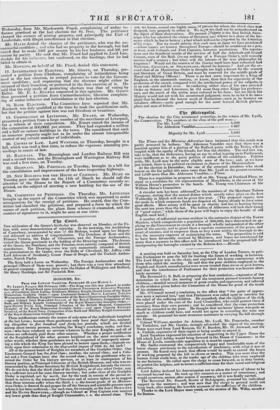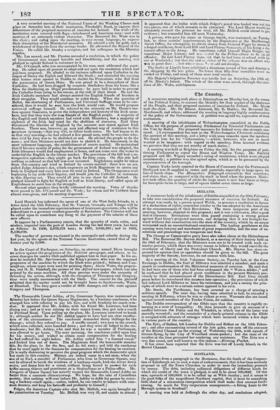A meeting was held on Saturday last, at the City
of London Tavern, to peti- tion Parliament to pass the bill for limiting the hours of working in factories. The Lord Mayor was in the chair, and expressed his hearty concurrence with those who called the meeting. He said that the poor children employed in the English and Scotch manufactories were worse treated than slaves or post-horses, and that the interference of Parliament for their protection was become abso- lutely necessary.
The Reverend C. S. Bull, in proposing the first resolution,—expressive of the detestation in which the meeting 'add the treatment pursued towards factory children„—detailed several instances of great cruelty and oppression, and referred to the evidence given before the Committee of the House for proof of the truth of his statements.
Mr. O'Connell moved a resolution, to the effect that "the gains of oppres- sion were a national loss," and that Parliament was called upon to interfere for the relief of the suffering children. He remarked, that the children of the rich were placed under the care of the Lord Chancellor, who could protect them if necessary from their own parents; and Ire considered that the same protection should be extended to the poor. He thought that ten hours' labour was quite as much as children could bear, and would not agree to extending the time one minute. He promised his most strenuous assistance in carrying the bill through the House.
Colonel Williams' member for Ashton, Mr. Lyall, Mr. Duncombe, member- for Yorkshire, and Mr. Oastler, strongly advocated the object of the meeting. Notes were read from Lord Kenyon, Sir F. Burdett, Mr. M. Attwood, and Sir A. Carlisle, expressive of their regret at being unable to attend it. Lord Teynhain expressed his intention of supporting in the Upper House the bill which Lord Ashley would bring forward in the House of Commons : in the House of Lords, considerable opposition-to it must be expected.- Mr. Sadler contrasted the comparatively happy and comfortable state of the lower classes previously to the introduction of machinery, with what it was at present. He feared very much that efforts would be made to extend the hours of working proposed by the bill to eleven or twelve. This was wore than the human frame could bear, at the tender age of the children who were employed in our factories. He called upon the clergy to come forward, as in duty bound, to protect the helpless, and to secure a sufficient time for their moral and religious education.
Lord Ashley declared his determination not to allow the hours of labour to be increased beyond ten. He took up this measure as a matter of conscience ; and
would u session after session if necessary, till it was finally carried.
The Reverend Dr. Russell, Rector of Bishopsgate, promised his individual support to the measure ; and was sure that the clergy in general could not hang back, after reading the horrible accounts of the sufferings of the children. Thanks to the Lord Mayor were voted, on the motion of kr. Wilks, membcr for Boston..
A very crowded meeting of the National Union of the Working Classes took place on Saturday last, at their institution, Theobald's Road, to express their abhorrence of the proposed measures of coercion for Ireland. The walls of the institution were covered with flags—tricoloured and American ones—and with mottoes of an extremely violent character. The Reverend Dr. Wade was in the chair; and calle4 upon the meeting, in very strong language, to express their detestation of the Ministerial measures. He advised a run for gold, and a avitbdrawal of deposits from the savings banks. He advocated the Repeal of the Union. He called Mr. Stanley a scorpion, and his colleagues in the Ministry reptiles.
-Mr. Lee moved, and Mr. Preston seconded a resolution, in which the policy of -Government was termed horrible and bloodthirsty, and the meeting was pledged to uphold Ireland in resistance to it.
Mr. O'Connell, who was accompanied by his sons, next addressed the meet- ing. He called upon all present to adopt and act upon the resolution which had just been proposed. He alluded to the tortures inflicted upon Catholics in the reigns of -Henry the Eighth and Edward the Sixth ; and reminded the meeting that houses were opened in Dublin to shelter the Protestants who fled from the persecution of Queen Mary. He was proud to be a descendant of those Catholics. He had been dragged by common thieftakers from his house like a felon for disobeying an illegal proclamation : he gave bail in order to prevent the Catholics from rising to his rescue, at the risk of their blood. He and the Irish Catholic members had always assisted the English friends of freedom in their struggles. They would continue to asaist them. When the question of Ballot, the shortening of Parliaments, and Universal Suffrage came to be con- sidered, then it would be seen how the Irish would vote. He would propose universal suffrage himself. He referred to the minority on Mr. Hume's mo- tion against Sinecures, to prove the independence and honesty of the Irish mem- bers, and that they were the trus friends of the English people. A majority of the English and Scotch members had voted with Ministers; but a. majority of eighteen of the Irish had voted for the abolition of sinecures. Earl Grey threatened the liberties of England by the measure now aimed against Irish freedom. There was, however, an easy and, effectual way of resistance to this ntrocious tyranny,—that way was, to refuse bank-notes. He had begun to do so that very morning—he had refused a five-pound note, until he was sure whe- . titer trial by Jury was to be abolished or not. He advised the people to do the same ; and then Ministers would not dare to abolish it. He denounced, in the most vehement language, the establishment of courts-martial. He maintained that if his own system of policy for the government of Ireland was adopted, the Irish labourers would find employment at home, and not come over the water to underbid the English in the labour market. The provisions of the bill had a re- trospective operation—they might go back for forty years. On this side hell nothing so infernal as that bill was ever invented. Englishmen might be taken from this country and tried in Ireland by courts-martial : there was an act, c ailed Judge Johnson's Act, which empowers an Irish Magistrate to arrest any body in England and carry him over for trial in Ireland. The Orangemen were beginning to lay aside their bigotry, and would join the Catholics in resistance to this Algerine act. They would all join in one shout for old Ireland. He pledged himself to fight for English as well as Irish liberty, and called upon all Englishmen to assist him in the struggle. Several other speakers then briefly addressed the meeting. Votes of thanks were passed to Mr. O'Connell and Dr. Wade ; for whom and for Cobbett three cheers were given, and the meeting dispersed.



















 Previous page
Previous page